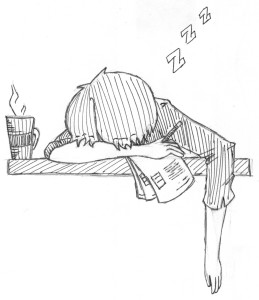Each person requires a specific amount of sleep each night in order to function properly. Whether that be five, seven or even ten hours per night is dependent on factors such as age and body chemistry. However, the truth remains that a fair number of people do not get their recommended daily amount.
According to the National Sleep Foundation (NSF), teenagers should clock around eight and a half hours of sleep each night, but only 15 percent of teens actually sleep that much on a school night. “I probably get about five to six hours each night on average for weekdays,” said senior Dorcy Jaffray, “and then around seven to eight on the weekends.”
The necessary amount varies for each individual. Teenagers’ biological sleep patterns can be irregular and may also shift to later times. For instance, it is fairly typical for a teen to be unable to fall asleep until at least 11 p.m.
“When I get a lot of sleep I tend to be more awake and ready to go,” said junior Brett Huston. “When I get very little sleep, I’m just dead. I have no motivation to do anything.”
Lack of sleep can increase the risk of catching an illness and may also spark aggressive behavior or reactions. It can also cause skin problems, a dependency on caffeine or an increased desire to consume unhealthy foods. Said Jaffray, “I don’t think my sleep patterns really affect me except for the fact that they probably helped create my coffee addiction.”
As high school students, it can be difficult to budget extra time for sleep, but there are various ways to ensure that students are making the most effective use of the time they do have. To fall asleep easier, it is important to avoid eating, drinking or exercising for the few hours before going to bed.
Keeping the bedroom cool, quiet and dark is another way to help calm down before preparing for sleep. If stresses or worries keep a person awake, jotting notes or to-do lists before bed can ease the mind and make it easier to fall asleep.
“Sometimes it’s really hard to balance school, friends, sports, other activities and sleep,” said sophomore Becca Schoen. “At the end of the day, I know that if I don’t get enough sleep, then I don’t have energy to do any of the other things, so I try and go to bed on time everyday.”
Having irregular sleep patterns affects students’ academic performance as well as their health. “It makes it hard to concentrate in some of my classes,” said senior Kaitlin Roller.
While it is one of the main reasons that teenagers stay up later and lose valuable hours of sleep, homework is a task best completed earlier in the evening. Leaving homework until the last minute not only keeps students up later, but also increases stress levels, causing it to be more difficult to actually fall asleep when the time comes.

Andrea Conover is the News Editor for The Spartan Speaks.







Noe Ebling • Jul 4, 2013 at 10:34 am
There are many causes of sleep deprivation. The stresses of daily life may intrude upon our ability to sleep well, or perhaps we trade sleep for more work or play. We may have medical or mental-health conditions that disrupt our sleep, and be well aware that we are sleep-deprived..;,’
Ciao for now <http://www.healthfitnessbook.com